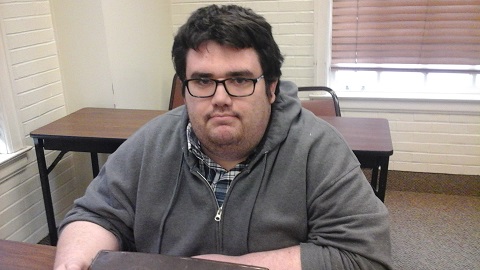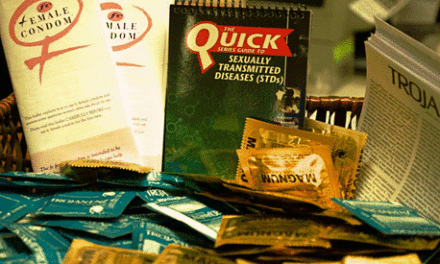By Alainna Caitlyn Earl and Emily Temple (Whetstone Staff Writers)
Brandon Reynolds was confronted about his sexual orientation during his freshman year at Wesley.
“When my roommates found out I was gay, they threw pennies at me,†he said. “They told me, ‘Pick them up, you f**ing faggot Jew’.â€
This may be an extreme example, but many students who identify themselves as lesbian, gay, bisexual or transgender say they have experienced versions of prejudice. Students in the LGBT community blame a lack of education about gender and sexuality for creating a negative atmosphere that makes “coming out†difficult.
LGBT students at Wesley are familiar with the terms expressed by Reynolds’ roommates.  They say they hear words such as “gay†and “faggot†a dozen times a day.
“It makes my skin crawl, hearing the word ‘faggot,’†freshman Travis Barcliff said. “I don’t let it get to me because, you know, words are just words.â€
Barcliff said he usually speaks up when he hears these words used, but he doesn’t believe the apologies he receives are sincere.
“People say whatever they want,†he said.
Senior John Wolgamot found that others’ attitudes made coming out difficult for him.
“I was closeted for my first two years, until the end of my sophomore year,†he said. “My roommates were big gay-bashers. How was I supposed to come out to people with something that means so much to me?â€
Wolgamot decided that he had to educate himself and his friends and to be open about LGBT culture.
“Put a little more thought into what you say and how it affects people,†he said.
Betty Lee, a freshman and “ally†(a friend of LGBT community, but who is not a member), knows firsthand that openness about sexuality can be valuable but difficult.
“I hand out condoms, and I’m just a person who talks about sex a lot,†Lee said. “I’ve gotten endless comments about being a girl and having sex, and how that will change who you are completely.â€
Dr. Linda De Roche, who teaches a gender studies class at Wesley, said she noticed the lack of student education on LGBT issues.
“When we talk about issues of gender identity, students have a hard time with that,†she said. “In my film class, I use Boys Don’t Cry. It’s the transgender and gender issues that are far more difficult for students to wrap their heads around.â€
Part of an education on gender issues, many said, includes an understanding of gender identity and the labels used in the community.
Using labels for different genders and sexualities is controversial, even within the LGBT community. “Gender identity†alone is a term that many have trouble defining.
“I think gender identity is how you decide to identify yourself on the gender spectrum,†Lee said. “That doesn’t have to mean male or female, but it can be somewhere in between or nothing at all, depending on where you feel comfortable.”
Some students, such as senior Ashly Bendorovich, don’t believe in relying on labels.
“I feel that it’s a social norm that things must be in categories to make sense,†she said. “I consider myself as, ‘I like who I like.’ It shouldn’t be in categories.â€
Wolgamot said people get caught up in labels.
“But I think having a label makes it a little easier to explain to people,†he said. “At the end of the day, everyone’s just a human being.â€
Many students said labels can be helpful in the correct context.
“I think labels can be empowering if you use them in an empowering way,†Lee said. “But then people use labels such as ‘faggot’ and ‘dyke,’ hateful labels, and that’s obviously not good.â€
Senior Laura Vargas said she sees both sides of the label debate in the LGBT community.
“I like (labels) because they help with numbers if there needs to be outreach in a certain direction,†Vargas said. “I don’t like them because people have to choose, and there’s a stigma with labels.â€
Vargas helped to revamp the club Ally into an organization now known as PEAS (Prideful Education & Awareness of Sexuality).
“We were undergoing a lot of change,†she said. “No one was coming to meetings, so last semester we reconstructed it. We have an amazing advisor that helps with ideas and support. We’ve restarted the organization, built up numbers and it’s running smoothly.â€
PEAS advisor Chelsey Vest, student outreach coordinator, said she is very careful about seeing to students’ comfort when discussing gender and sexuality.
“I think it’s important to be transparent about my support for the LGBT community,†Vest said. “I hope to find new and better ways of advocating for this community at Wesley.â€
Most members of the LGBT community said Wesley is a relatively accepting community that needs more education on gender identity and sexuality.
“I think there’s room for improvement,†Lee said. “But I definitely don’t think anyone would get physically hurt on this campus over this issue.â€
“There’s a lot of assumptions about people’s sexuality,†Wolgamot said. “But it’s better to ask an uncomfortable question so that you can come to a better mutual understanding.â€
Reynolds said the campus is a safe place but that LGBT issues can slip through the cracks.
“When LGBT students have an issue, a lot of people in the administration and faculty overlook those issues,†Reynolds said. “But there are some staff and faculty who are more accepting and willing to help the students than others.â€
Dean of Students Wanda Anderson emphasized that Wesley is working to protect LGBT students from harassment on campus.
“We do have policies in place at the college to address issues of non-civility,†she said. “It’s called Title IX and you will hear much more about this in the coming weeks.â€
De Roche said she hopes that students will become more aware of gender issues.
“I hope that they don’t feel uncomfortable around people different than them,†she said. “This way they’ll know what questions to ask when issues arise.â€
For those interested in learning more about gender and sexuality, Wesley College offers a gender studies minor which includes an Introduction to Gender Studies course and upper-level seminars such as Gendered Rhetoric.
Additionally, the organization PEAS meets at Fridays at 2 p.m. in CC206C to offer a more casual discussion of gender and sexuality.




